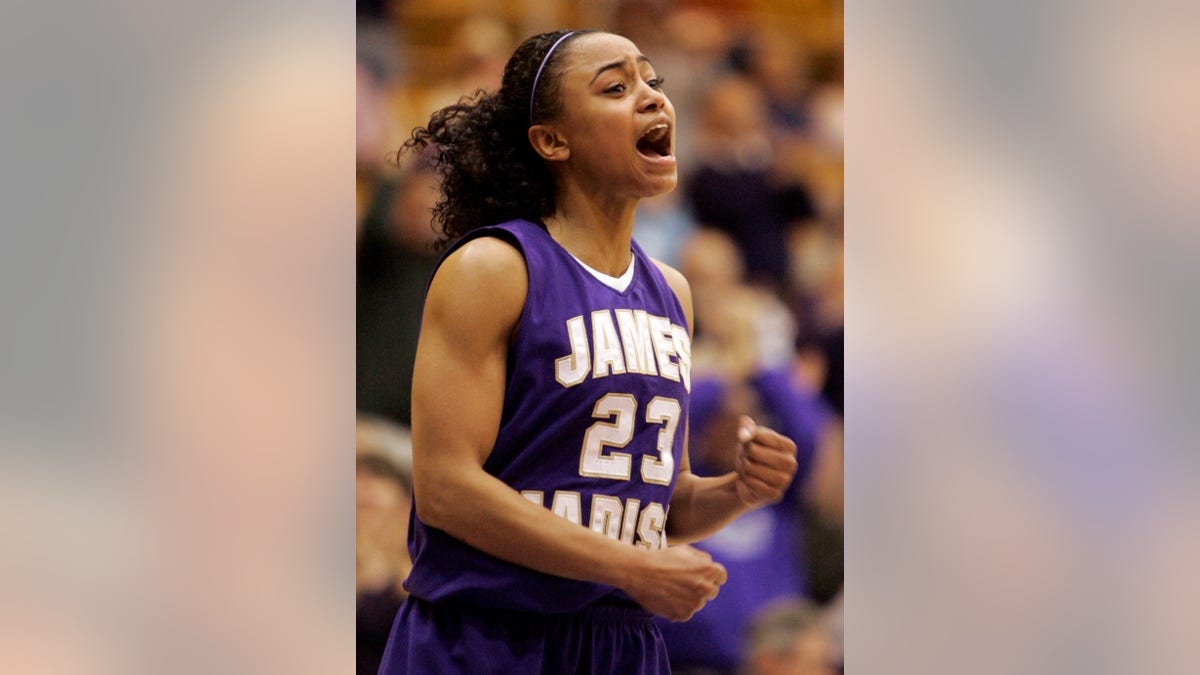
FILE - In this March 14, 2009, file photo, James Madison guard Dawn Evans rallies her team during second half of an NCAA college basketball game in Harrisonburg, Va. Evans, one of the nation's leading scorers for three years as a point guard at James Madison, has left her professional team in France and returned to Tennessee to prepare for a kidney transplant. (AP Photo/Steve Helber, File) (The Associated Press)
Dawn Evans knew a kidney transplant was inevitable. She just didn't know it would be now.
The former James Madison point guard had to put her professional career on hold when her doctor contacted her with the news that her kidney disease had worsened and it was time to come home. One of the nation's leading scorers in college, Evans was in her second season with Arras of the French League when she got the call.
"I was upset," said Evans, a 5-foot-7 guard with a quick first step and range to score from anywhere on the court. "Having to leave midseason? I always imagined it happening in a way where I'd say, 'Ok, I'm ready. I'll call my doctor and we'll schedule it two months ahead of time and we'll get this done.' At the end of a season. I didn't expect it to be a decision that would be made for me."
Evans, 24, had been sending blood samples home every six weeks. She submitted another to her doctors on Jan. 6, the day she returned to France after a short stay at home in Clarksville, Tenn., for Christmas break. She hoped the results would show that her kidney function had improved with her daily regimen of up to 47 pills.
Instead, it showed that her kidney function was declining.
Her kidney function has been monitored constantly since Evans was diagnosed in December 2009 with focal segmental glomerular sclerosis. FSGS disrupts the filtering system in her kidneys, causing high blood pressure and headaches while sometimes leaving her with low energy reserves.
Besides her own doctor, Evans also sought a second opinion from the doctor who treats former NBA star Alonzo Mourning for FSGS.
Mourning played four seasons in the NBA after his kidney transplant in December 2004, and he and Evans have corresponded a few times each year since becoming aware of their shared medical histories. Mourning said he tries to let people know that no matter the issue, one's approach can make all the difference.
"It's like anything in life," said Mourning, a vice president for the NBA's Miami Heat. "You become as knowledgeable as you can. An individual who's going through anything, especially a health-related issue and when they don't know what they're dealing with but they educate themselves about it, their confidence changes. It helps them."
Pending final testing, Evans will get a kidney from her cousin, Erika Evans, of Prince George's County, Md.
Erika, 28, got tested as a possible match when she learned Evans would need a kidney, and was found to be compatible on four of the six markers.
"The lady there explained that the higher the markers, the more likely it is that her body will accept it and not reject it, so at that point, it was like, 'How do you not go with it?'" Erika said. "I'm very spiritual, so I just kind of felt like it was God."
Dawn Evans doesn't intend to let the transplant sideline her. Like Mourning, she intends to play again.
With Arras, she played 50 games over two seasons, averaging 33 minutes and 13.3 points.
While her kidney disease was not widely publicized in France, Arras team officials and her teammates knew about it. Team president Jean-Louis Monneret issued a statement expressing his "deep admiration for this girl from her journey and her personality" and leaving open the door for her return.
"We hope ... that she may soon play in Arras," Monneret said in the statement.
Evans' Arras teammate Anael Lardy said, to her, Evans "is like a super hero."
"She had bad kidney condition but she wanted to keep fighting for the team. She was amazing," Lardy wrote in an email to The Associated Press. "Since the beginning of the season we already knew about her situation but she never talked about her health condition. She never complained.
"I wish her the best (with her transplant) but I am sure and I have no doubt. She will come back."
If everything goes as planned, Evans not only plans to play again, but hopes to eventually get another shot at the WNBA. She believes publicity about her disease contributed to her going undrafted out of college. Evans had a tryout with the Connecticut Sun in 2012 but didn't make the roster. She did play in three regular-season games for the Los Angeles Sparks that year.
Her parents, while concerned about her desire to play again, also know not to count her out.
"Outside of this disease, she's an extremely healthy person," her father, Rodney Evans, said Tuesday. "We just came back from her doctor today and he was just extremely amazed at how strong her heart is. ... It's tough on a parent, but it's nothing compared to what she's had to deal with herself."
Evans hopes that by getting the transplant now, she will be ready to play when practice begins in France next October.
Cecile Piccin, an Arras assistant coach, looks forward to once again being able to pencil Evans in as the team's starting point guard.
Signing her was "the best choice the president and me did in 4 years," Piccin wrote in an email. "We'll do the same when she tells them she's ready to play again."
___
AP Sports Writer Tim Reynolds in Miami contributed to this report.








































